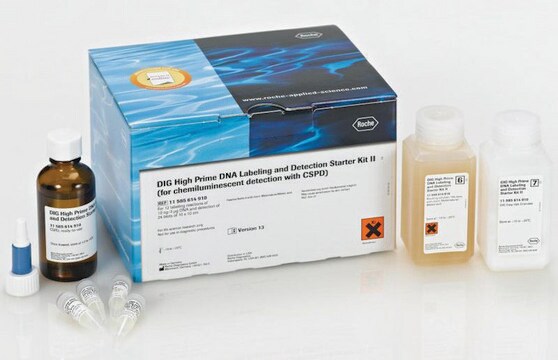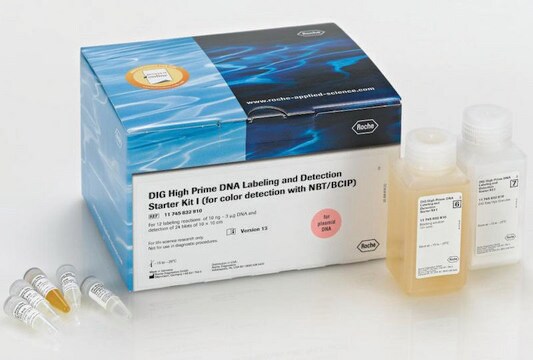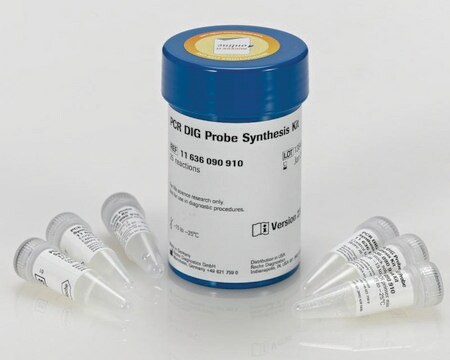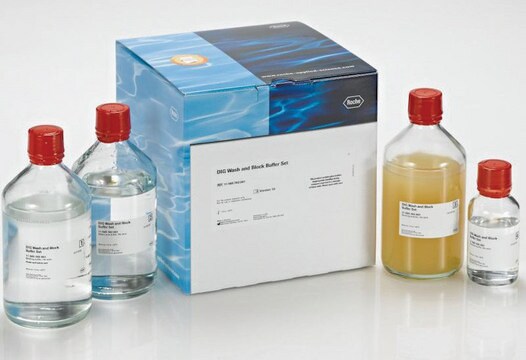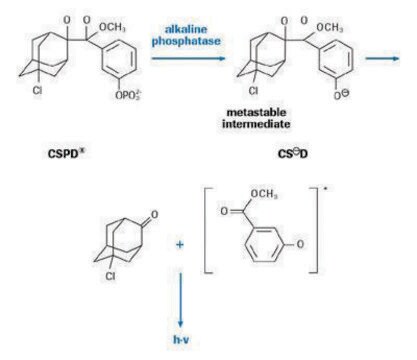11093657910
Roche
DIG DNA Labeling and Detection Kit
Sinónimos:
dna labeling and detection kit, dig
About This Item
Productos recomendados
usage
sufficient for 25 labeling reactions
sufficient for 50 blots
Quality Level
manufacturer/tradename
Roche
greener alternative product characteristics
Designing Safer Chemicals
Learn more about the Principles of Green Chemistry.
sustainability
Greener Alternative Product
greener alternative category
, Aligned
storage temp.
−20°C
General description
Contents:
- Unlabeled Control DNA 1, 100 μg/ml
- Unlabeled Control DNA 2, 200 μg/ml
- DNA Dilution Buffer
- DIG-labeled Control DNA, 5.2 μg/ml
- 10x Hexanucleotide Mix
- 10x dNTP Labeling Mixture
- Klenow Enzyme, Labeling grade, 2 U/μl
- Anti-digoxigenin-AP-conjugate, 750 U/ml
- NBT/BCIP Concentrated Stock Solution
- Blocking Reagent
Specificity
Application
- Southern blots
- Northern blots
- Dot blots
- Colony and plaque screening
Packaging
Preparation Note
Other Notes
Solo componentes del kit
- Unlabeled Control DNA 1 100 µg/ml
- Unlabeled Control DNA 2 200 µg/ml
- DNA Dilution Buffer
- DIG-labeled Control DNA 5.2 µg/ml
- Hexanucleotide Mix 10x concentrated
- dNTP Labeling Mixture 10x concentrated
- Klenow Enzyme, Labeling grade 2 U/µl
- Anti-digoxigenin-AP-conjugate antibody 750 U/ml
- NBT/BCIP Concentrated Stock Solution
- Blocking Reagent
Storage Class
13 - Non Combustible Solids
wgk_germany
WGK 3
flash_point_f
does not flashNot applicable
flash_point_c
does not flashNot applicable
Certificados de análisis (COA)
Busque Certificados de análisis (COA) introduciendo el número de lote del producto. Los números de lote se encuentran en la etiqueta del producto después de las palabras «Lot» o «Batch»
¿Ya tiene este producto?
Encuentre la documentación para los productos que ha comprado recientemente en la Biblioteca de documentos.
Artículos
Digoxigenin (DIG) labeling methods and kits for DNA and RNA DIG probes, random primed DNA labeling, nick translation labeling, 5’ and 3’ oligonucleotide end-labeling.
Nuestro equipo de científicos tiene experiencia en todas las áreas de investigación: Ciencias de la vida, Ciencia de los materiales, Síntesis química, Cromatografía, Analítica y muchas otras.
Póngase en contacto con el Servicio técnico
